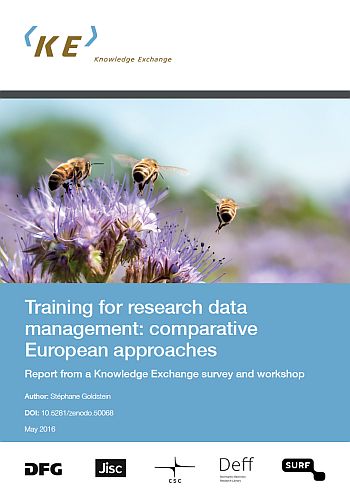New KE report: Training for research data management: comparative European approaches
Posted: May 20th, 2016 | Author: Sven | Filed under: Report | Tags: Knowledge Exchange, RDM, Training | Comments Off on New KE report: Training for research data management: comparative European approaches Knowledge Exchange (KE) has released a new report: “Training for research data management: comparative European approaches” is it called and it marks the preliminarly result of a longer time of discussions among several European stakeholders and communities.
Knowledge Exchange (KE) has released a new report: “Training for research data management: comparative European approaches” is it called and it marks the preliminarly result of a longer time of discussions among several European stakeholders and communities.
At the end of 2015, KE initiated a project to compare approaches in research data management (RDM) training within the partnership’s five member countries. The project was structured around two strands of activity:
The group developed a survey to collect information on current practice around RDM training, in order to provide an overview of the RDM training landscape in several European countries. Subsequently, a workshop in February followed to share successful approaches to RDM training and capacity building provided within institutions and by infrastructure.
For the survey, the report lists some key findings:
- Training materials are very largely geared for universities, faculties and departments
- PhD students are recipients of almost all the training, although not exclusively
- A preponderant amount of the training is not focused on any particular type of data
- Virtually all phases of the research data lifecycle are well covered by the training endeavour
- Almost all of the training is provided either wholly or partly on site, face-to-face
- Data curators and data librarians are the main group that delivers the training, but researchers themselves are also responsible for much of the delivery
- The number of individuals who have received training since 2014 is relatively low for most organisations
- Awareness building is seen as by far the biggest perceived impact of the training.
In contrast, the workshop discussions addressed a number of broad questions, like
- How to develop among researchers, and others, an awareness of RDM training needs ?
- Means of measuring the success and impact of training interventions, along with changes in practice and behaviour.
- The challenges associated with the successful implementation of training initiatives.
- The role of different categories of players, other than researchers themselves, notably research administrators, records managers and archivists, learned and professional bodies, and research funders.
Elaborating on these questions, the discussions considered what might be done, practically, to make training more relevant to the professional lives of researchers, and to encourage good RDM practice with a view to effecting behavioural and cultural change.
Suggestions included:
- Providing incentives for training, professional development and good practice from research funders, learned / professional bodies and publishers.
- Charting the RDM capabilities of universities.
- Identifying the RDM roles of key professional groups.
- Engaging with learned / professional bodies to assess whether and how their policies and practices relate to RDM.
- Investigating the potential for a sustainable registry of information on training resources.
In my personal opinion, the workshop and the survey were a good starting point to learn form each other and to hear about practises in other European countries. Of course, the whole work in this particular field is not finished by publishing a report. It is much more a starting point for further discussions and cooperation. The challenges in RDM and in training researchers are an important task for the present and also for the future. It is clear, that many efforts are needed to archieve the goal to train substantial parts of current and future researchers.
The full report is available here.







